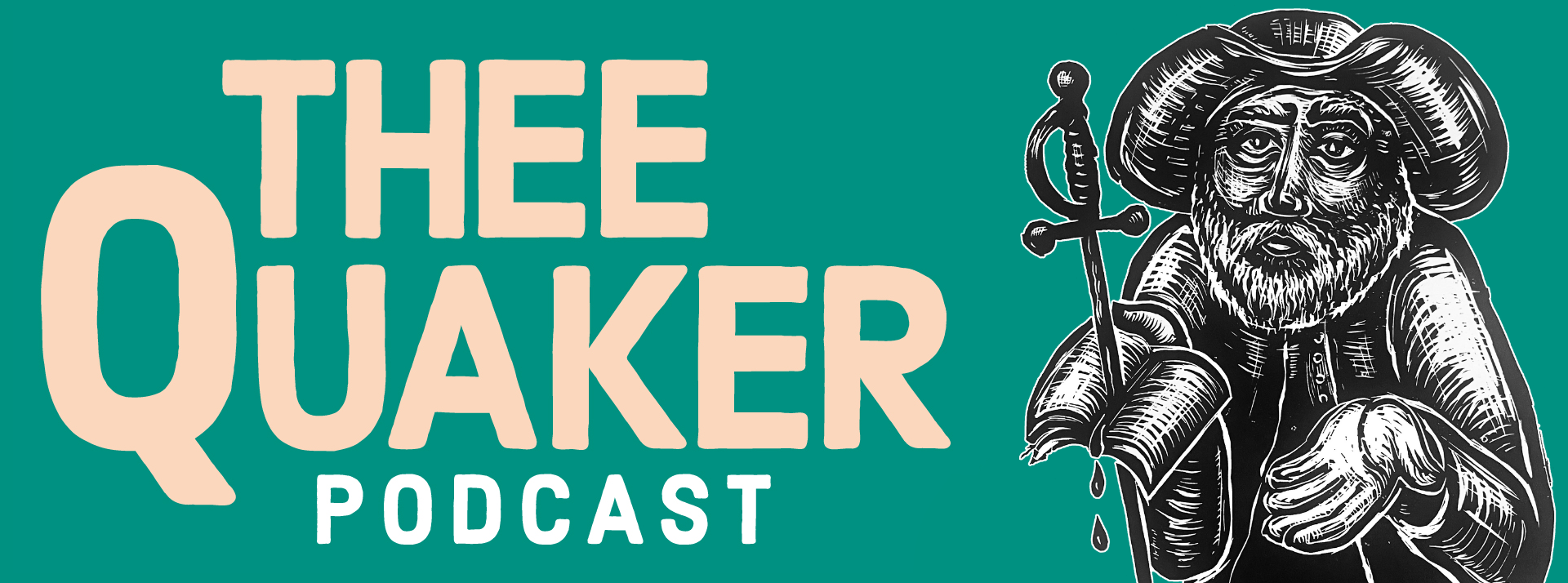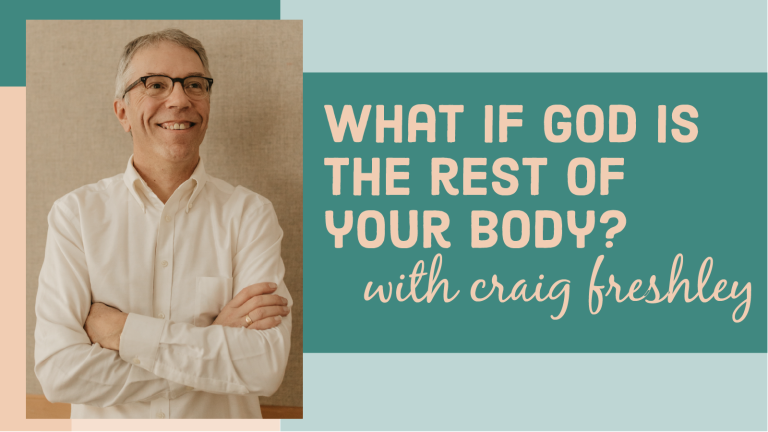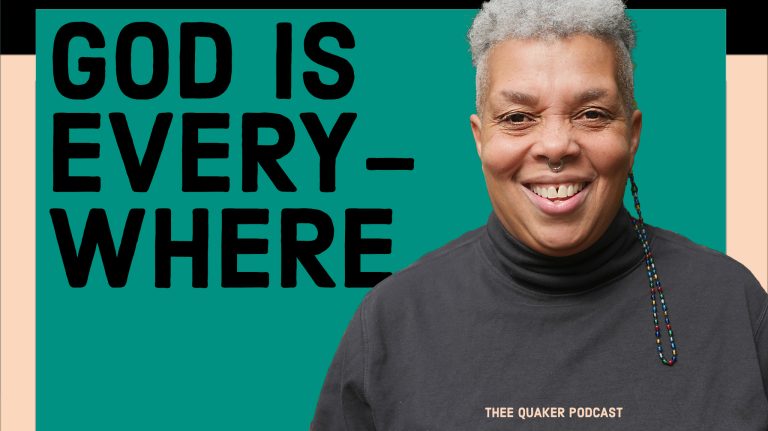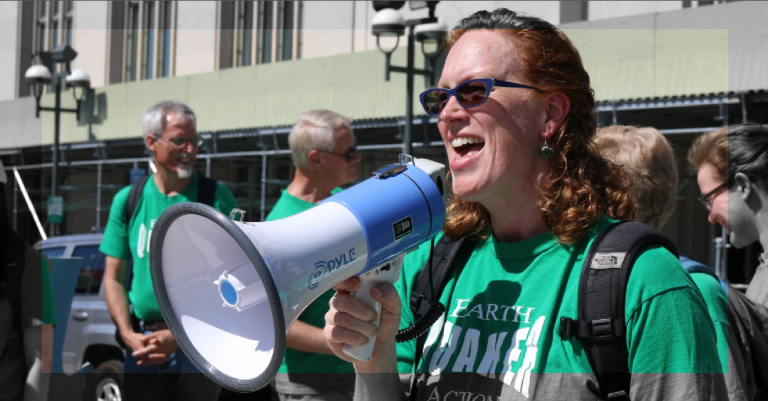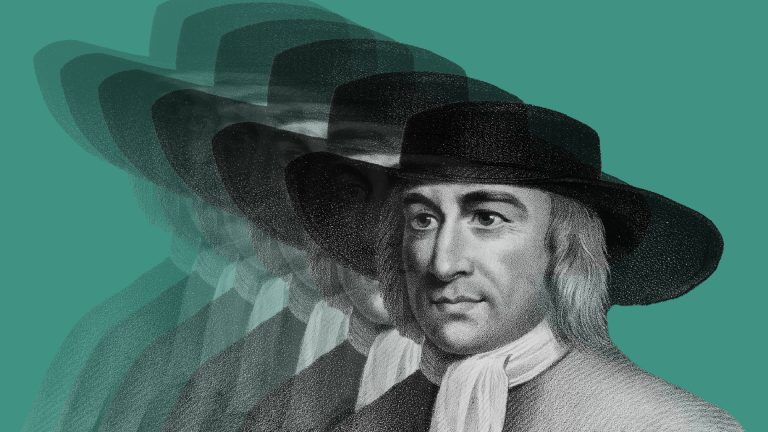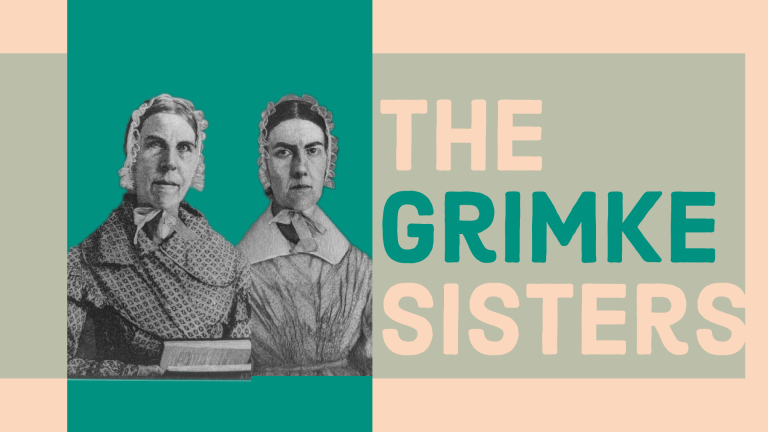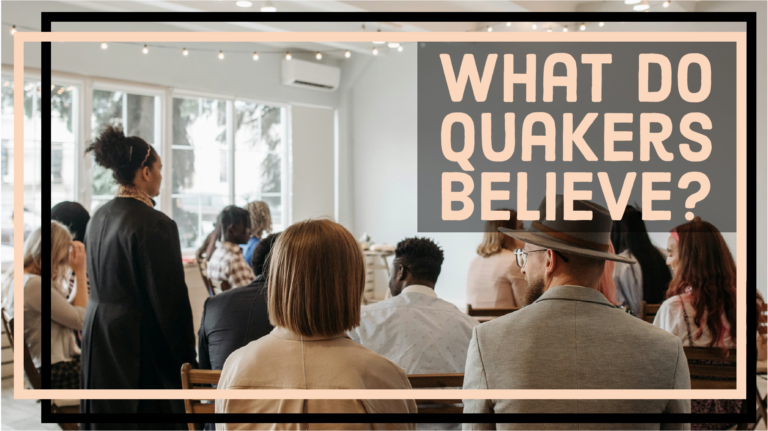Lost and Found: Finding God’s Voice in the Wilderness
Feeling lost, lonely, and directionless is part of the human experience, just ask the Biblical prophet Elijah. Faced with death for his convictions, he ran into the wilderness and found a God who met him in his grief and despair.
On today’s episode, Quaker pastor Andy Stanton-Henry shares a message of getting lost and being found by the still small voice of the divine. And he helps us lean in to hear it, too.
Subscribe so you don’t miss an episode!
Leave a comment below to share your stories and thoughts!
Download the transcript and discussion questions.
Discussion Questions
- How has the still small voice guided you in the past?
- What or who are the loudest voices in the soundscape of your life?
- How can we protect silent spaces in our lives as individuals and as a faith community?
Andy Stanton-Henry
If all we do is sit in silence for a few minutes that’s a contribution. First of all, that’s a radical thing in our society. Like that’s, that’s worthwhile in of itself just practicing being quiet together.
Various
Thee Quaker Podcast: Story, Spirit, Sound.
Georgia Sparling
I’m Georgia Sparling.
Jon Watts
And I’m Jon Watts.
Georgia
And today we’re excited to bring you our first vocal ministry episode of the season!
Jon
Yeah. That’s right. For many Quakers, one of the core manifestations of our faith is this moment when the Spirit moves us to speak, and so we stand and give a message. As a Quaker podcast, we thought it was only right to try to capture that energy in our show, and so we did some experimentation in the first season with what we called “vocal ministry” episodes. The five vocal ministry episodes we posted last year proved to be some of our most powerful, and some of our most popular. So I’m definitely excited to get into it. So Georgia, who will be giving ministry on today’s episode?
Georgia
Well, today we’re going to hear from Andy Stanton-Henry. He’s on the show to share a message that he recently gave at Lost Creek Friends Church, which is a small meeting in East Tennessee that he and his wife, Ashlyn, co-pastor.
Jon
Great. Yeah many Friends may be familiar with Andy’s work as the associate director of the Quaker Leadership Center at Earlham School of Religion. Plus, he recently published a book about spiritual leadership in small towns, and he also just joined the board of Thee Quaker Project, which is the organization that publishes this podcast.
I’ve been excited about Andy’s ministry for a while now, and I’m really looking forward to hearing his message and getting to know him a little bit better. For example, are Ashlyn and Andy originally from Tennessee?
Georgia
Yes and no. So Ashlyn is from Tennessee, though not Lost Creek, and Andy came from Ohio. They both have M.Divs — or masters of divinity — from Earlham School of Religion, and they served in ministry in a few places before moving to Jefferson City, Tennessee.
Jon
So tell me about Andy’s message. What are we going to hear today?
Georgia
Well, it is a programmed meeting — they have music and a message. They also spend time in waiting worship, which is fitting because this message is about quiet and listening for God. I thought it would be a great message for Friends who are from silent meetings as well as those from, well, louder ones.
Jon
Haha right yeah. Wwo of our core demographics. Ok sounds great, let’s hear it.
Georgia
Ok. Here is Andy.
Andy Stanton-Henrys
I live in Jefferson City, Tennessee and co-pastor with my wife Ashlyn a meeting called Lost Creek Friends. It’s a programmed meeting in nearby New Market, Tennessee. Yeah, it’s definitely this kind of small country church feel to it. And it’s actually a very historic meeting. It was founded in 1796. It was very involved in Underground Railroad. There were actually a hospital in the Civil War for both Union and Confederate soldiers, which apparently didn’t please people, because I got burned down a couple of times.
When Ashlyn and I moved here we were looking for a face community to join. And there’s a quote from Quaker Thomas Kelly about how people who follow the inner voice can shake the countryside from 10 miles around. I realized that it was originally from George Fox, and I mean, at that time, 10 miles around was, you know, a big deal. But I’ve also become kind of a localist. And so I was like, maybe 10 miles around actually is the, the right number. And so I did a search of what Quaker meetings there were within 10 miles. And it was the only one. We went to visit we pulled up in there was only one car in the parking lot.
When we walk in, there’s just one, one guy sitting there in the pew. Even though they’re a pastoral meeting, they hadn’t had a pastor for a long time. And literally, it was just this one guy most Sundays. He was very surprised to see us there. In fact, we joke with him now because he he was he was like, “What are you doing here?” And not exactly the most, you know, well, the greatest welcoming committee, or whatever, but we decided to stay and we talked with him and he sent a message and said on Facebook and said, “Would you come preach? It might help.” With that invitation, how can you say no?
And so I did and then Ashlyn did and, and then we started to get more involved, and some more folks started to come. And eventually they asked us to kind of take on a part time pastoral and so that’s where we are. We’ve got, I don’t know an average of 12 to 15 people or so every, every week. So that may not seem like a lot. But you know, when you’re starting with one, I don’t know the math the percentage fits pretty, pretty good growth, I guess. And so part of just when we started was just providing kind of a consistent leadership on Sunday mornings. And then some some folks started to come back.
I mean, it is it’s kind of strange. It’s just like this this small meeting that was kind of barely hanging on and all sudden these two people with M.Divs just show up in one Sunday. Not to toot, toot our horn or anything but it was it’s it’s kind of a unexpected kind of providential thing. Hopefully bring some some new life and I certainly feel like we’ve done.
Something that’s different at Lost Creek and it can be jarring to people who are not used to it, but people will sometimes just interrupt the sermon. That can be a little jarring if you’re just expecting it to be all about the preacher. But it’s like, well, that is supposed to be, we’re all supposed to be ministers. We’re all gathering around and listening. And so that makes sense. And just learning to be willing to, to go with that.
Ashlyn and I, we usually do, like a series things in a series and so we will get together ahead of time, and say, okay, like what’s coming up for us what seems like there’s life or energy or interest about, whether it’s a topic, or whether it’s, you know, a portion of scripture. And we’ll, we’ll plan a series around that. I mean, I know that for for Quakers, we always try to leave room for the Spirit to come and, you know, mess with our plans. And we try to do that. But also, for us, at least, we don’t think that having some, some structure is opposed to the Spirit. The Spirit can help us plan and prepare ahead of time, as well as in the moment.
So, I will open up the passage that we’re planning to kind of ground the message in and just start to make observations about the passage, write down, things that come up, either from the passage or the topic or quotes that come up and, and then kind of more midweek I start to look over that, like, is there a pattern here? And also be asking, what does our context like? What is our community? What’s going on there? Is there anything that we can be speaking to, or in the wider the wider world, and also listening, like, just leaving room to be like? Is there anything that God wants to say specifically, to them or to us, but this series is, we’re calling it The Listening Life.
And it’s a series for the season of Lent. You know, oftentimes, not so much among Quakers, but other traditions will give up something for Lent, you know, chocolate or coffee or whatever. Instead of doing that kind of thing, inviting people to either limit or set aside something that’s distracting. So each Sunday, we talk about a different way that we can listen to God or a different place we listen to God so we’ve done in the wilderness, we’ve done in Scripture, and then this Sunday is listening for this still small voice within.
I’ve got kind of a full Google doc of ideas and and something of an outline for Sunday. So the writing of is also kind of a meditation and prayer full preparation.
Georgia
After the break, Andy shares his sermon on listening to that still small voice.
Jon Watts
Hey, Becca, it’s Jon Watts. How are you?
Becca Godwin
Hi, I’m doing well.
Jon Watts
You gave us a donation in June of 2023. Thank you so much for your contribution. And you left us a comment that said that you’re quasi Quaker who loves good storytelling. So I was wondering if you could tell me about that. How are you? What does that mean to be a quasi Quaker?
Becca Godwin
Yes, so my mother was raised Quaker. Her grandfather became Quaker after his experience in the military. And so we grew up in Jacksonville, Florida, she would take the four of us kids to meetings. So I was, you know, held as a baby in the Quaker meeting. And then when I moved away, and started living in different cities, I would go, I would go in the different cities that I went, but I never really started going regularly as an adult until last year, when I was living in Nashville. Started going regularly, really got a lot out of it. And then I moved away from Nashville. And I haven’t gone to, to the local meeting, where I live now yet, but I have had the podcast to listen to. And so it’s helped sort of bridge this transition.
Jon Watts
Yeah. Thank you. So. So what was it like to go to Quaker meeting again?
Becca Godwin
It reminded me a lot of my experiences when I was younger, just, you know, it’s always a different building, but the what in my experience, there’s always a similar kind of energy and calmness As that just radiates from these from these spaces. Listening to the podcast helps give some some depth to these like intangible things that I’ve that I’ve always heard and felt and provide some context.
Jon Watts
So I wonder if you have any advice for us in in making, you know, season two of the of the podcast.
Becca Godwin
I mean, not really, just to keep doing what you’re doing.
Jon Watts
Oh, thank you.
If you’re like Becca, and you’re hoping and pulling for this podcast to be the best Quaker podcast it can be then we could really use your support. Thee Quaker Podcast is listener supported. And I’m so happy to say that in season one, we met our financial goal of 65 monthly supporters. Thank you, so much. However, we know from the analytics that this show is reaching about 3,500 listeners every month. So if you’re one of those, those 3,435 folks who are listening, but haven’t quite made it yet to QuakerPodcast.com/Support please do. It would mean a lot to us and to listeners like Becca. Thank you. And back to the show.
Georgia
Welcome back, we’re going to begin the second half of our episode in the same way that Lost Creek Friends Church starts theirs. Andy told me that the church has a few traditions that they practice each week. And one of those is the ringing of their church bell, which as you’re about to hear is done by the children in their meeting with great joy.
Andy
I’ll never forget the time that I got Lost in the woods as a kid. I was about 10 or 12 years old. And we were blessed to have several acres of woods in our backyard and spent a lot of time in those woods. And I knew that like the back of my hand. I knew so well, in fact that I blazed a trail through those woods. It was so great that I named it very modestly, the Henry Trail. It was the perfect length to walk and then circle back, and then come back and retire at home.
But one day, I decided to do something different. Just watched a John Wayne movie, and so I was feeling rugged and adventurous. So I put on my flannel shirt, grabbed my hat, packed some water and Ritz crackers for rations, and set off, first along the well worn paths of the Henry Trail, but then I decided to go off trail into the darker shadows of the woods, where no man had traveled before. Or at least I had never been.
It was fun for a while, but then I started to feel increasingly uncertain about where I was in relation to the trustee Henry Trail. My anxiety was temporarily relieved when I saw some light coming through a field. So I jogged over to the field. And it was indeed, a field but not one that I recognized. Then I started to panic. I couldn’t find a way forward, and I couldn’t figure out how to retrace my steps. So I had to admit it, I was lost. Have you ever gotten lost outside in the woods? It’s truly terrifying.
And maybe you’ve also felt lost in your life, which is also truly terrifying. In both cases, the natural reaction is to panic, to start running this way, or that whacking branches out of the way, hoping by sheer force of will to conquer the wild. In my case, I did eventually find a road and then walked along the road and made it back home safely. But there are faster ways to get home. And in the bigger stretches of wilderness, panicking can be very dangerous, sometimes even deadly. So what’s the alternative?
A hint, it has to do with learning to hear and trust the still small voice of God. We get some insights from the story of an old prophet. The scripture reading today is from 1 Kings 19:7-13. It’s a man named Elijah. You may have heard about him, he was a trailblazing prophet, who got lost. But he did find his way home. Eventually.
Georgia
I’m just going to pop in here and do the scripture reading since the microphone didn’t pick that part up.
1 Kings 19: 7-13: The angel of the Lord came back a second time and touched him and said, “Get up and eat for the journey is too much for you.” So he got up and ate and drank. Strengthened by that food. He traveled 40 days and 40 nights until he reached Horeb, the mountain of God. There he went into a cave and spent the night and the word of the Lord came to him, “What are you doing here, Elijah?”
He replied, “I have been very zealous for the Lord God Almighty. The Israelites have rejected your covenant, torn down your altars and put your profits to death with the sword. I am the only one left and now they are trying to kill me too.” The Lord said, “Get out and stand on the mountain in the presence of the Lord. For the Lord is about to pass by.” Then a great and powerful wind tore the mountains apart and shatter the rocks before the Lord. But the Lord was not in the wind. After the wind, there was an earthquake. But the Lord was not in the earthquake after the earthquake came a fire, but the Lord was not in the fire. And after the fire came a gentle whisper. When Elijah heard it, he pulled his cloak over his face and went out and stood at the mouth of the cave. Then a voice said to him, “What are you doing here, Elijah?”
Andy
Thanks be to God. Well, a little bit of context for our reading today. Before this passage, Elijah has a big showdown with the Prophets of the GOD Baal. The Cliffnotes version is that Yahweh shows himself to be superior to the lesser gods with a display of firepower. The queen vows to murder Elijah.
Understandably, Elijah gets a bit worried about this, and we are told he quote, “ran for his life.” He runs out into the wilderness until he finally just collapses under a broom tree. He tells God he’s done with leadership. And he’s done with life itself. Elijah passing out under the broom tree was not an act of wisdom or courage on his part. But it turns out to be about the best thing he could have done. What I didn’t know as a kid lost in the woods, and I’m sure Elijah didn’t know either was a helpful acronym.
STOP.
S stands for stop. Sit down, stay put, don’t panic.
T means think. Review what you do know about your location, and situation.
O stands for observe. Look around and see if you can gather any information, any landmarks, any clues.
And then P stands for plan. What are your options and potential courses of action? Choose one and proceed. So when you get lost, STOP. That doesn’t come naturally to us. In many ways, Quaker spirituality is a stop spirituality. We’d like to joke that we flip the conventional wisdom on its head. Whereas you’ve heard the saying, don’t just sit there do something. Whereas Quakers flip that around and say don’t just do something sit there.
Of course, there’s a time to press on, to push through to persevere and be found faithful. But there’s no inherent virtue to frantic faithfulness to actions that make us more lost, to methods that make us more and more of a mess. Im the wisdom of God. Sometimes sitting still is an action. The Quaker writer Scott Russell Sanders writes, “When the pain of leaving behind what we know, outweighs the pain of embracing it. Or when the power we face is overwhelming, and neither fight or flight will save us. There may be salvation in sitting still.” He goes on to clarify, “By sitting still, I do not mean the paralysis of dread, like that of a rabbit frozen underneath the dive of a hawk. I mean something like reverence, a respectful waiting, a deep attentiveness to forces which are greater than our own.”
If we learn this, to sit still before forces greater than our own, it can save us a lot of trouble. Maybe even our lives, maybe even our souls.
We must learn to be a still listening people. In order to hear the still speaking voice of God, we must learn to be a still listening people. You see, the stop acronym reflects a deep spiritual wisdom that reaches across the ages. Standing between the sea and an army of Egyptian oppressors. Moses told the people, “The Lord will fight for you. You only need to be still.” So if we want to be guided home by the still small voice of the Spirit, we first have to stop running, stop striving, sit still until we’ve regained our bearings. And sometimes like Elijah, we don’t do this until we crash. I call it Sabbath by sickness. I’ve been prone to that in my life. But graciously when Elijah crashes under the tree he’s cared for by angels.
Notice what they bring Elijah. Food, water, rest, touch, food, water rest, touch. Before there’s any command before there’s any commissioning, there’s a gentle reminder to take care of the body that God gave him. In the process of replenishing his body, his soul was being restored. And his spirit was being prepared for something new. The angel says, “Get up and eat, for the journey is too much for you.” And it’s too much for us. If we don’t care for our bodies and souls, and let others care for us from time to time. We all need people who encourage us to drink water, eat food, get sleep, and have from time to time appropriate loving touch. We are human beings, not God’s, we still have limits and needs and vulnerabilities.
So sometimes the first step in hearing God’s still small voice is listening to the still small voices in your body, asking for attention.
I’m learning to recognize signals. Like when I feel nervous, it’s often my body saying this is important. Be ready be present. When I feel excited, it’s often my body saying this is life giving and energizing for you. Jump in, enjoy it. Sometimes I feel a persistent sense of dread and resistance that I don’t really understand. I can tell you that I almost always regret not listening to that. Back to our Bible story, Elijah stops and halts. He gets some help from the angels. He continues on his journey. But now he doesn’t seem to be running away so much as he’s journeying toward. He goes to an old favorite of his people, a sacred space.
Of course, God can speak to us anywhere. But sometimes being in a particular place helps us hear a little bit more easily. Elijah was going to Mount Horeb, also known as Mount Sinai, the mountain where those runaway Hebrew slaves entered into a covenant relationship with God and became a people, the people of Israel. And on that mountaintop, they, they saw all the fireworks of God, displaying God’s glory. And they were given those great commandments about how to live justly and righteously. So Elijah makes his pilgrimage to that place, and takes shelter in the cave. And in that cave, he hears the divine voice. The Holy One asks him, “Elijah, what are you doing here?” It seems like God loves to ask questions. But after the question comes an instruction, go out and stand on the mountain, in the presence of the Lord.
For the Lord is about to pass by. In some sense, God is always about to pass by. Because God is always present and active and doing a new thing. We don’t control the presence of God. But we can position ourselves to be present to that presence. To be awake, when God does move, to be listening, when God does speak. Traditionally, we call these spiritual practices or spiritual disciplines. And theologically, we talk about being saved by grace through faith. We can’t earn it, force it make it happen. We can be ready to receive it. Elijah positioned himself for the presence and what an encounter he had. First came the wind. Ah, yes, God has come as the wind before. But God was not in the wind. Then came an earthquake.
Ah yes, God had come as an earthquake before. But God was not in the earthquake. And then came a fire. Ah, yes. God had come as a fire before, but God was not in the fire. So how did God come? The NIV that we read today calls it a gentle whisper. Another version calls it the sound of sheer silence. And the old King James calls it the still small voice. Why a whisper? Why a still small voice? Maybe that’s what Elijah needed. He was still suffering from burnout, trauma, mental health crisis, deconstruction, whatever you want to call it. And he needed a quiet voice. And often that’s what we need as well. Whether we are burned out prophets, or ordinary folks with broken down bodies, human beings with broken hearts. We most often need whispered words.
Thankfully, this seems to be the way that God works with us and speaks with us. The apostle Paul said that it’s God’s kindness that leads us to repentance. Quaker Thomas Kelly called it the holy whisper. Why whisper? Maybe also because God seeks intimacy with us. When someone whispers, you have to lean in, come close. If we want to hear the holy whisper, we will have to protect a little bit of silence in our lives. Silence is rarely empty. It’s often full of distractions and temptations, and dominating voices or haunting memories. But it’s also a place where we experience the present Christ, the presence of God, the Word of God.
And as we move into a time of waiting worship, prioritizing a little silence in our worship together, I offer you queries that may help you reflect. How has the still small voice guided you in the past? What are the loudest voices in the soundscape of your life? And remember sometimes it’s not what but who? Sometimes it’s people from our past, or people in our life, Friends or enemies. And then how can we protect silent spaces in our lives as individuals and as a faith community? So let’s listen together for the holy whisper. And if something rises for you that can be helpful for all of us, please, do share with us.
Georgia
Andy and I spoke again after he gave his message. And we started out by talking about the challenges of embracing silence.
So I mean, the topic of silence is, is one obviously very important to Quakers, but it’s also been something I feel like that’s been talked about a lot in the past few years, partly with the pandemic, maybe, in a lot of people being alone, but also just with all our electronic devices and all the things that can distract us. So as you were working on this message, like how do you feel like that kind of challenged you?
Andy
I’ve have actually, for several years seen sermon preparation as a kind of spiritual practice because it it’s interesting how it’s, I mean, you’re you’re, you’re thinking in multiple directions, like you’re thinking about the congregation that you’re speaking to, you’re thinking about what the text says, and you’re also thinking about what’s real in my own life.
There’s a Thomas Kelly talked about firsthand sermons. And those are the only ones that really make a difference kind of in his in his theology. And so I tried to do that I tried to like, have something that’s real on my own. On life that I speak to, and share, because it’s kind of that deep calls to deep thing you know, where people recognize when something’s authentic and real and personal and when it’s just a lecture.
So in the process of writing a sermon, there is a lot of self reflection that happens, part of firsthand sermons, too, is just like being honest about, like, I don’t, this is still hard for me, like, for example, with silence, I mean, I’m, I’m a Quaker, and I’m an introvert, kind of with a contemplative type personality.
So silence is natural in some ways. But also, I’m just like everybody else that’s so shaped by culture, and, you know, consumer, consumerism and just all the constant noise, that it’s still a discipline for me.
Georgia
For people who listen to this talk, and who are thinking like, silence is scary, or who feel trepidation about spending time in silence, or dedicating a regular amount of time to just sitting in silence how would you respond to those fears or apprehensions?
Andy
I think my encouragement is to start small. I mean, literally, if it’s just one minute of silence, sit for one minute in silence. And it’s okay, if nothing happens. Like, I think it’s just like any other. Whether it’s a spiritual practice or a discipline, whether you’re learning a new sport or a musical instrument, you start and it’s awkward, and it’s difficult at first, and, and you’re a beginner, and that’s okay. And you just grow more and more comfortable with it. I’ve been in this program, called the Soul of Leadership, with the Shalane Institute.
And, and one of the things they say is “remember that silence itself can be a contribution.” I think it’s important to remember when it comes to, especially like waiting worship times. It’s okay if, if all we do is sit in silence for a few minutes, that’s a contribution. First of all, that’s a radical thing in our society. Like that’s, that’s worthwhile and of itself, just practicing being quiet together. So that that can be a contribution, whether it means listening, making room for other people who don’t normally speak, or whether it just means cultivating that spirit of openness and quiet. That’s
Georgia
That’s really good.
Andy
Yeah
Georgia
Well, thank you. I appreciate it
Andy
Of course.
Georgia
Thank you for listening. And thank you to Andy Stanton-Henry for sharing his message with us. Today’s message was abbreviated for time. So you can go to our website, QuakerPodcast.com to listen to Andy’s complete message. And if you’d like to learn more from Andy check out his book, Recovering Abundance: Twelve Practices for Small Town Leaders. We’ll have a link on our website along with the queries that Andy listed at the end of his message and a transcript of this episode. That’s at QuakerPodcast.com.
This episode was recorded and produced by me, Georgia Sparling. Jon Watts wrote and performed the music. Studio D mixed the episode and Your Moment of Quakers Zen was read by Grace Gonglewski.
Thee Quaker Podcast is a part of Thee Quaker project, a Quaker media organization whose focus is on lifting up voices of spiritual courage and giving Quakers a platform in 21st Century Media. If you want to partner with us, please consider becoming a monthly supporter. Every contribution expands our capacity to tell Quaker stories in a fresh way and Ititmakes this project more sustainable. Visit QuakerPodcast.com for more information.
And now for Your Moment of Quakers Zen.
Grace Gonglewski
Elizabeth Fry, 1799, Memoir of the Life of Elizabeth Fry, Volume One: I believe there is something in the mind or in the heart that shows its approbation when we do right. I give myself this advice. Do not fear truth. Let it be so contrary to inclination and feeling. Never give up the search after it. And let me take courage and try from the bottom of my heart to do that, which I believe truth dictates if it leads me to be a Quaker or not.
Georgia
Sign up for daily or weekly Quaker wisdom to accompany you on your spiritual path. Just go to DailyQuaker.com. That’s DailyQuaker.com.
Recorded, written, and edited by Georgia Sparling. Cohosted by Jon Watts.
Original music and sound design by Jon Watts (Listen to more of Jon’s music here.)
Mixed and mastered by Studio D.
Supported by listeners like you (thank you!!)
Image by GarryKillian on Freepik
Referenced in this episode:
- Andy Stanton-Henry is a writer, Quaker minister, chicken-keeper, and distraught Reds fan. He holds degrees from Barclay College and Earlham School of Religion, and is a doctoral student studying Open and Relational Theology. He carries a special concern for rural leaders, leading to his recently published book Recovering Abundance: Twelve Practices for Small-Town Leaders.
Andy has also trained in spiritual direction, labyrinth facilitation, conflict transformation, and entrepreneurial ministry. A native Buckeye, Andy now lives in East Tennessee with his spouse, Ashlyn, their blue heeler Cassie, and their laying hens.
Listen to Andy’s unedited message. - Lost Creek Friends Church
